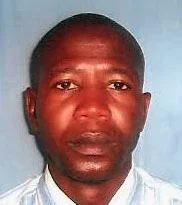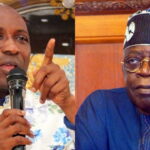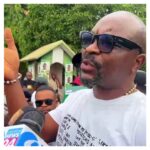Afolabi Gambari
There increasingly seems to be a dearth of speech writers in Nigeria these days. It is such that a speech as the one for a national day – which was supposed to be momentous as to be gripping to leave the listeners at home and around the world with lasting impression – took off on a pitiful, submissive note. Hear Mr. President: “Fellow Nigerians, as I address you today, I am deeply aware of the struggles many of you face in these challenging times. Our administration knows that many of you struggle with rising living costs and the search for meaningful employment. I want to assure you that your voices are heard.” It was as if the first paragraph of the speech was the subject matter and it was as if the matter had not already been discussed (even if not addressed) virtually since the #EndBadGovernance protest in August.
It was repetition galore as assurances that had been offered on the deprivations endured by Nigerians over the last fifteen months were offered all over again. Hear Mr. President once more: “As your President, I assure you that we are committed to finding sustainable solutions to alleviate the suffering of our citizens. Once again, I plead for your patience as the reforms we are implementing show positive signs, and we are beginning to see light at the end of the tunnel.” Although these lines required much details, Mr. President gave little, if at all, making the whole thing look like a mere routine.
The next paragraph showed self-mockery in an alarming manner. Mr. President said, in case many had forgotten: “Exactly 64 years ago, our founding fathers chose democracy as a form of government and launched the dream of a great country that would lead the rest of Africa out of poverty, ignorance, and underdevelopment, a beacon of hope to the rest of Africa and the world.” He probably did not reckon how the “founding fathers” would now be turning in their graves seeing how poverty, ignorance and underdevelopment now threaten to define Nigeria in an age when the world is moving at a pacy rate and how many Nigerians with the “can-do” spirit are being forced to leave the country in droves particularly in search of dignity in far-away lands.
The talk about success in the economy, as always, remained anticipatory rather than concrete. Perhaps, for reasons best known to the speech writers, the speech shied away from the promises on the resuscitation of the major refineries that have so far remained unkept. Nor did it focus on the small and medium scale businesses that have been ripped asunder by pernicious economic policies that derived from the previous administration. Nor even did it address the crisis that has exposed the underbelly of Nigeria National Petroleum Company Limited as a larcenous entity, indicating that it is still business as usual, despite promises to the contrary by the current administration.
Meanwhile, although the youths of Nigeria who populated the recent #EndBadGovernance protest have had their demands treated with disdain, even as some of their leaders were hounded into several detention centers without any charge, the independence speech suddenly depicted el dorado for the country’s youths in another act-now-and-think-later carriage that has defined this administration. Mr. President said: “I am pleased to announce the gathering of a National Youth Conference. This conference will be a platform to address the diverse challenges and opportunities confronting our young people, who constitute more than 60 per cent of our population.” This declaration was every inch a product of poor thinking and planning for what the president said would be a “30-day confab”, considering he also said: “The modalities of this confab and selection of delegates will be designed in close consultation with our young people through their representatives.” Except such confab, if eventually constituted, would be an exercise for which a large pack of youths would be gathered and induced with money and other goodies to simulate serious deliberation, there is absolutely nothing that would be discussed there that have not been already discussed at the #EndSars protest of 2020 as well as the aforementioned #EndBadGovernance protest. What should be left is for this administration to demonstrate genuine concern for the youths and their future by addressing their demands and acting appropriately on them.
For the avoidance of doubt, the youths’ ten-point demand was as unambiguous as it is relevant, namely hunger, high cost of living, insecurity, reduction in government spending, the release #EndSARS Judicial Panel reports and implementation of recommendations, including payment of compensations, protection for farms and farmers, human capital development, electoral reform, establishment of a living wage, constitutional and judicial reforms. In the end, the foregoing demand goes beyond the need for the youths as the proper address of it would benefit the whole country across all ages. How the administration would seek to subject the discussion on all this to a “30-day confab” should be baffling indeed, not least the irony of spending huge amounts in staging the confab while still lamenting “paucity of funds”.
Back to the speech writers, going forward. It would certainly not be a bad idea to first weigh the national mood vis-à-vis pooling resources to put together a commemorative speech that should serve as a reference point for many years to come. After all, a president does not present a national speech many times.







